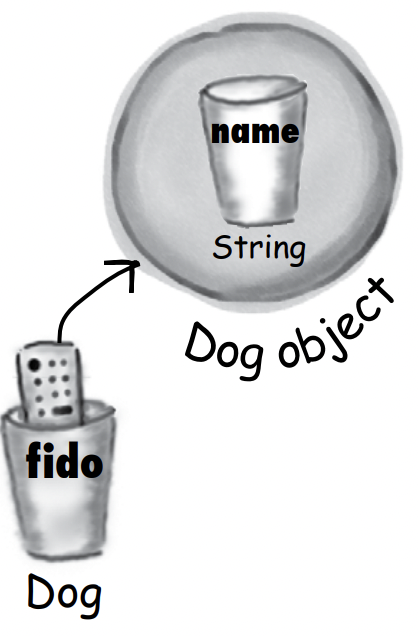Variables
Instance variables always get a default value.
- integers, chars - 0
- floating points - 0.0
- booleans - false
- references - null
Local variables exist within a method.
- they do not get default values
"Global" variables
While there isn’t a concept of 'global' variables and methods in a Java, marking a method as public and static makes it behave much like a 'global'.
- Any code, in any class of your application, can access a
public staticmethod.- this is exactly how the
Math.piproperty andMath.random()methods are declared.
- this is exactly how the
- And if you mark a variable as
public,static, andfinal, you have essentially made a globally-available constant. - these static (global-like) things are the exception rather than the rule in Java. They represent a very special case, where you don’t have multiple instances.
Primitive vs Object Reference Variables
Variables can either be a primitive or a reference
Primitive
Primitive variables hold fundamental values (think: simple bit patterns) including integers, booleans, and floating point numbers. They are the most basic building blocks.
- int, long, float, double, boolean, char, byte, short
Numbers
(all are signed)
-
Byte - 8 bits
-
Short - 16 bits
-
Int - 32 bits
-
Long - 64 bits
-
Float - 32 bits with decimal
-
Double - 64 bits with decimal
Reference
Reference variables hold a reference to the object.
- that is, the object itself does not go into the variable; the variable only holds a pointer to it.
They are based on a class made up of primitives
- String, Scanner, Random, Die, int[], String[]
anal: think of a reference as a variable that holds a remote control. The remote control knows how to control the object that it refers to.
- Using the dot operator (
.) on a reference variable is like pressing a button on the remote control to access a method or instance variable.

Anything that is not a primitive is an object.
the == operator is used only to compare the bits in two variables
- if we are using the
==operator to compare 2 objects, what we are really doing is comparing the object references. If both variables reference the same object, then we will gettrue - therefore:
int a = 3;
byte b = 3;
if (a == b) /* true */
When an object is created, the following steps happen:
- The JVM allocates space for a reference variable, and gives it a name and a type
- The JVM allocates space for the new object on the heap
- The reference variable is linked to the object
Because an object reference is simply a pointer, they are all the same size
Null Pointer Exceptions
Reference variables can be set to null, which means "I am referencing nothing"
- If you try to dereference one of these variables (either explicitly by you or through Java automatically) you get a
NullPointerException
The NullPointerException (NPE) typically occurs when you declare a variable but did not create an object and assign it to the variable before trying to use the contents of the variable.
public void doSomething(SomeObject obj) {
// Do something to obj, assumes obj is not null
obj.myMethod();
}
// if the method gets called with a null value, we will get a NPE
doSomething(null);
Garbage Collection
Each time an object is created, it goes into an area of memory known as The Heap.
- it’s not just any old memory heap; the Java heap is actually called the Garbage-Collectible Heap.
- When you create an object, Java allocates memory space on the heap according to how much that particular object needs.
- ex. An object with, say, 15 instance variables, will probably need more space than an object with only two instance variables.
- When the JVM can see that an object is no longer referenced by a variable, that object becomes eligible for garbage collection